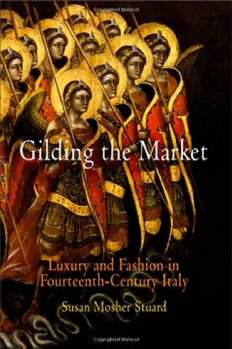
Gilding the Market: Luxury and Fashion in Fourteenth-Century Italy PDF
Preview Gilding the Market: Luxury and Fashion in Fourteenth-Century Italy
Gilding the Market Gilding the Market Luxury and Fashion in Fourteenth-Century Italy Susan Mosher Stuard UniversityofPennsylvaniaPress Philadelphia TheMiddleAgesSeries RuthMazoKarras,SeriesEditor EdwardPeters,FoundingEditor Acompletelistofbooksintheseriesisavailablefromthepublisher. Copyright(cid:2)2006UniversityofPennsylvaniaPress Allrightsreserved PrintedintheUnitedStatesofAmericaonacid-freepaper 10 9 8 7 6 5 4 3 2 1 Publishedby UniversityofPennsylvaniaPress Philadelphia,Pennsylvania19104-4112 LibraryofCongressCataloging-in-PublicationData Stuard,SusanMosher. Gildingthemarket:luxuryandfashioninfourteenthcenturyItaly/SusanMosherStuard. p.cm.—(TheMiddleAgesseries) Includesbibliographicalreferencesandindex. ISBN-10:0-8122-3900-8(cloth) ISBN-13:978-0-8122-3900-3 1.Luxurygoodsindustry—Italy—History—To1500. 2.Luxuries—Italy—History—To 1500. 3.Clothinganddress—Italy—History—Medieval,500–1500. 4. Fashion—Italy—History—To1500. 5.Consumption(Economics)—Italy—History—To1500. 6.Italy—Economicconditions. I.Title. II.Series. HD9999.L853I87 2006 381(cid:2).45687(cid:2)094509023—dc22 2005050370 Frontispiece:OpulentcostumeadorningtheThreeKings.AltichierodaZavioandJacopo Avanzi,AdorationoftheMagi,c.1379.OratoriadiSanGiorgio,Padua.ArtResource,N.Y. Contents ListofIllustrations vii 1 Introduction 1 2 DesirableWares 20 3 GravitasandConsumption 56 4 CurbingWomen’sExcesses 84 5 CostsofLuxuries 122 6 ShopsandTrades 146 7 Marketmakers 182 8 Conclusion 220 Notes 233 Bibliography 285 Index 313 Acknowledgments 323 Illustrations AltichierodaZavioandJacopoAvanzi,AdorationoftheMagi, c.1379 frontispiece Plates Followingpage136 1. ReliquaryforthefootofSt.Blaise,probablyeleventhcentury 2. SchoolofGiotto,St.FrancisRenouncesAllWorldPossessions,1298 3. GiottodiBondone,OgnissantiMadonna,c.1305 4. GiottodiBondone,ExpulsionofJoachimfromtheTemple,c.1305 5. GuarientodiArpo,detailfromAngelicOrders,c.1350 6. MasteroftheUrbinoCoronation,TheAnnunciationtoZacharias, 1350–1400 7. Centermedallionofatwelve-medallionnecklace,fourteenthcentury 8. SchoolofGiovannidaMilano,LafamigliodelconteStefanoPorro,fresco, 1370,OratoriadiS.Stefano,LentatesulSeveso 9. Nicolo` daBologna,MadonnaandChildEnthronedbetweenSaints PetroniusandAlle(Eligius),ChristintheInitialA,after1383 10. MasteroftheMadonnaofMercy,St.EligiusWorkingaGoldSaddlefor KingClothar,latefourteenthcentury 11. MasteroftheMadonnaofMercy,paneldetailfromCommissionfromKing ClothartoSt.Eligius,latefourteenthcentury 12. Crucifixion,England,c.1395 13. WisdomPersonified,miniature,cuttingfromaBibleHistorialebyGuiart deMoulins,Paris,c.1400 14. LippodiVani,Priest,leaffromagradual,Siena,mid-1340s Figures 1. TreatiseontheSevenVices,Genoa,1350–1400 6 2. Clevelandsilvergiltbelt,Siena,fourteenthcentury 50 3. AltichierodaZavio,CouncilofKingRamiro 58 4. Portraitofayouth,detail,frescoinSanGiovanniinConca 68 viii Illustrations 5. DamisellaTriulcia,virginculaMediolanense 102 6. AltichierodaZavio,BonifacioLupiandCaterinadeiFrancesiPresentedto theVirgin 107 7. SchoolofLorenzetti,IlDiavoloTentatoresottoAspetoFemminile 111 8. Vestisdeseta,fromTacuinumSanitatis 147 9. JacobellodiBonomo(attributed),JohntheBaptist 232 Chapter 1 Introduction If the fourteenth-century fashionable could have seen themselves! If they had, perhaps the first age of fashion would have sputtered out rather than caught fire. As chance had it, mirrors adequate for head-to-toe scrutiny cameintouseonlytowardthemiddleofthenextcentury,sotheconstructive exerciseofself-scrutinywasclosetoimpossible.Considerwhatthosepioneers of fashion might have seen upon inspection of their decked-out selves: robes hikeduptothecalf,thenthethigh,rightuptothebrinkofindecency;padded shoulders,tightfit,parti-coloredtunicsandhose;tasseledhoods,floppyhats, slashedand elongatedsleeves,liningsasrichasrobesthemselves;andenough gilded silverware in accessories that the swish and rustle of fine fabrics were setoffbytheclinkandclatterofmetalornament.Garisheffects,brightcolors, gilt, and military affectations ushered in the age of fashion in Italian market towns.Andthisreferstomen’sfashionablegarb;thecuriousroleofwomen’s fashioncomesintothediscussionlater. For both men and women the restrained, the refined, the carefully pre- paredaestheticstagingofself,basedonasoberdiscernmentofthenicetiesof self-fashioning, had to wait for a later day. The first age of fashion was bla- tantlyobviousandadamantlygarish,whichgoesalongwaytowardexplaining fashion’s initial impact on manners, urban culture, customer preference, and heighteneddemandformaterialgoodsinthefourteenthcentury. Making wise decisions about the sometimes alarmingly expensive goods thatcomposedfashionableoutfits—bothpurchasinganddisposingofthem— becameapressing concerninthefourteenthcentury,notjustintheprosper- ouserabeforetheBlackPlague,landwars,bankfailures,andothereconomic misfortunesloomedovertheItalianpeninsula,buteveninthesecondhalf of the century when fashion found its way into the normal routine of everyday town life. A fine sensitivity to the demands of le pompe, that is, the public display of private wealth, spread from community to community. Display of wealthwasaprojectformarkettownswherefashionflourishedandmentook up shopping as a diverting pastime. While the high style of court society had long been recognized by Italian merchants as a lucrative market to be culti- vated and fed, courts represented relatively contained and inelastic opportu- nity. Newer fashion-fed urban consumption promoted a more robust, if
